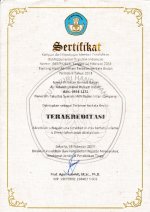Analyzing the Maduranese's Traditional Inheritance from al-Tūfi’s Maslahah Theory
Abstract
This study reveals the tradition of inheritance distribution among the Maduranese community and analyzes it using the maslahah of al-Tūfi. Although the entire Maduranese community adheres to Islam, in terms of inheritance distribution, they tend to apply customary inheritance law, only a small portion of which applies Islamic inheritance law (farāidh). This research is qualitative research; the data is obtained from interviews, observations, and documentation. This study found that most Maduranese people only give inheritance portion to children's groups, rarely did they include other groups as stipulated in farāidh law. Apart from that, the distribution pattern is also different from one region to another. In Sumenep, for instance, the distribution of inheritance prioritizes girls over boys. In Sampang, priority is given to the eldest child, while in Bangkalan it is prioritized for the youngest child. Only in Pamekasan, the distribution of inheritance is distributed to all family members in equal portions. This pattern of distribution that does not comply with the provisions of Islamic inheritance law, when viewed from the perspective of maslahah al-Tūfi, is still in line with the principles of Islamic law because it aims to bring good, avoid conflict, as well as to adjust to customary provisions and community development.
Keywords
Full Text:
PDFReferences
Azizy, A. Qodri, Pajak Itu Zakat, Uang Allah Untuk Kemaslahatan Rakyat, Bandung: Mizan, 2005.
Abdul Mannan, Teori dan Praktek Ekonomi Islam, Yogyakarta: Dana Bhakti Prima Yasa, 1997.
Abdur Rouf, a teacher of the Qur'ran in Karang Penang Sampang, 2020.
Afidah Wahyuni and Harisah, ‘Humanism Inheritance Distribuion In Sampang Madurese Culture’, Ahkam: Jurnal Hukum Islam, 19, No.2 (2019)
Cammack, Mark, ‘Islamic Inheritance Law in Indonesia: The Influence of Hazairin’s Theory of Bilateral Inheritance’, Studia Islamika, 10.1 (2003)
Dari, M., a marketing employee of Sampang Wali Songo Sharia Cooperative, 2020.
Faidi, Ach., a villager of Dungkek Batang-Batang Village, Sumenep, 2020.
Fairuzzabadi al-, Al-Qāmūs al-Muhīth, Bairut: Dār al-Fikr, n.d.
H. Rasul, Residents of Pasangrahan Village, Kwanyar Bangkalan, 2020.
Haries, Akhmad, ‘Analisis Tentang Studi Komparatif Antara Hukum Kewarisan Islam dan Hukum Kewarisan Adat’, Fenomena, 6.2 (2014), 217–30.
Harisah and Zainulloh, ‘Praktik Distribusi Zakat Konsumtif Tradisional di Karang Penang Sampang’, Ulûmuna: Jurnal Studi Keislaman, Vol.5 No.2 (2019).
Hermanto, a villager of Karang Penang Sampang, 2020.
Hilal, Judah, “Al-Istihsān wa al-Mashlahat al-Mursalah” in Majlis al-‘A’lā li al-Ri’āyah al-Funūn al-Ijtimā’iyyah, Usbū’ al-Fiqh al-Islāmī, Egypt: Lajnah al-Qānūn wa al- ‘Ulūm al-Siyāsah, 1330 H.
K. Ahmad Zainal Abidin, Chairman of PCNU and Caretaker of Bangkalan Islamic Boarding School, 2020.
Kaban, Maria, ‘Penyelesaian Sengketa Waris Tanah Adat Pada Masyarakat Adat Karo’, Mimbar Hukum-Fakultas Hukum Universitas Gadjah Mada, 28.3 (2016), 453–65.
Kafi, Abdul Hamid, a villager of Karang Cempaka Bluto, Sumenep, 2020.
Kuran, Timur, ‘The Islamic Commercial Crisis: Institutional Roots of Economic Underdevelopment in the Middle East’, The Journal of Economic History, 63.2 (2003), 414–46 .
Ludfi, a villager of Ketawang Laok, Guluk-Guluk, Sumenep, 2020.
Maimun, Pengantar Hukum Kewarisan Islam, Surabaya: Pustaka Raja, 2016.
--------, ‘The Existence of Mèkol Nyo’on Formula in Tradition of Inheritance Division in Madura’, KARSA: Journal of Social and Islamic Culture, 24.1 (2015), 67–83
Muhammad Hasan, a Bangkalan City Residents, 2020.
Muzaki, Kiki Adnan, Asep Saepudin Jahar, and Muhammad Amin Suma, ‘Reform of The Law of Inheritance in Turkey and Tunisia’, Al-’Adalah, 17.2 (2020), 249–68.
Mishrī, Ibn Manzhūr al-Afriqī al-, Lisān al-‘Arāb, vol. 2, Beirūt: Li al-Thibā’ah wa al-Nasyr, 1955.
Nursyamsudin, Nursyamsudin, ‘Pembagian Harta Waris Sebelum Muwaris Meninggal Dunia Menurut Perspektif Hukum Waris Islam’, Mahkamah: Jurnal Kajian Hukum Islam, 3.1 (2018), 69–85.
Putra, Galih Mahendratama, Adad Adad, and Gunarto Gunarto, ‘Juridical Review On Notarical Testament In The Perspectives Of Islamic Inheritance Law’, Jurnal Akta, 5.2 (2018), 487–90
Rifqi Azhari, Religious Leader of Lenteng Village, Sumenep, 2020.
Sopyan, Yayan, Nusirwan Nusirwan, Isnawati Rais, and Asmawi Aswawi, ‘Degradation of Customary Inheritance Law in The Sai Batin Lampung Tribe’, Al-’Adalah, 17.2 (2020)
Syarifuddin, Amir, Hukum Kewarisan Islam, Jakarta: Kencana, 2004.
Uha, Ismail Nawawi, Isu-Isu Ekonomi Islam, Kompilasi Pemikiran dan Teori Menuju Praktik di Tengah Arus Ekonomi Global, Jilid 2, Jakarta: CV. Dwi Putra Pustaka, 2001.
Uzlifatil Jannah, a guardian of the Wali Songo Islamic Boarding School in Sampang, 2020.
Wahyuni, Afidah, ‘Humanisme Waris Dalam Islam’, SALAM: Jurnal Sosial dan Budaya Syar'i, 6.1 (2019), 13–26.
Zaid, Musthafa, Al-Mashlahat fi al-Tasyrī’ al-Islāmī wa Najm al-Dīn al-Thūfi, N.p.: Dār al-Fikr al-Arabi, n.d.
Zainulloh, a lecturer of Miftahul Ulum Islamic Boarding School in Panyeppen Pamekasan and Treasurer of Sampang, Wali Songo Sharia Cooperative, 2020
Zubaidi, Muhammad Murtadha al-, Tāj al-‘Urus, 2nd ed, Mesir: Mathba’ah al-Khairiyyah al Munsya’ah Bijmaliyyah, 1306 H.
Zuhaili, Wahbah al-, Al-Fiqh al-Islāmī Wa Adillatuh, Juz. 8, Damaskus: Dar al-Fikr, 1989.
Zuleika, Adelina, and Ni Putu Desinthya, ‘Islamic Inheritance Law (Farāid) and Its Economic Implication’, Tazkia Islamic Finance and Business Review, 8.1 (2014) .
DOI: http://dx.doi.org/10.24042/adalah.v18i1.8649
Refbacks
- There are currently no refbacks.
Copyright (c) 2021 AL-'ADALAH
Al-'Adalah is licensed under a Creative Commons Attribution-ShareAlike 4.0 International License.

1.png)

.png)
_(1).png)
_(1).png)

.png)
